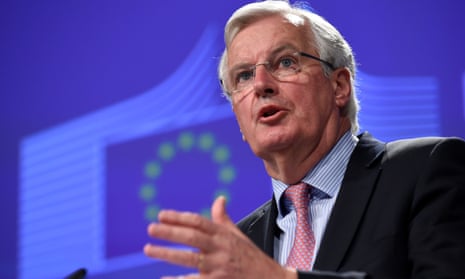I was very surprised to see the headline on your front-page article on the EU negotiating stance formulated as “EU threatens May on trade talks and its citizens’ rights”.
I do not think this is justified. It is not a threat, it is a statement of a position that has evolved in the last nine months within the various EU institutions involved in the process and has been consistent over time.
I am afraid such language, which gives an impression of the UK being a victim of a process it voluntarily started, contributes to a rather confrontational stance that will inform public opinion and sour, if not poison, the understanding of what the coming months of negotiation will bring. I was really disappointed to see this headline in the Observer, which I understand is aiming for an objective stance.
Lydie Stokes Fialova
Edinburgh
“Why is she asking for our vote?” you ask (“So far, May’s campaign is devoid of vision,” Editorial comment). The answer, purportedly, is to ensure that she has a bigger mandate when talking to 27 other countries, all with vested interests in the outcome. Does she really believe that Spain will care about the size of her majority when it has a golden opportunity to press her about the future of Gibraltar, or that Poland will care in the slightest when negotiating the future of Polish citizens in Britain?
May’s appalling policy of using other European citizens in Britain as a human shield when negotiating our exit has already been overturned by the 27, which won’t even start to negotiate until they have the assurances they seek about their citizens.
“Why is she asking for our vote?” Surely it is a naked grab for power, as well as an opportunity to remain prime minister for the next five years.
Martyn J Tuckwell
Northumberland
Demand for oil is drying up fast
Your warning to oil producers (“As wind, wave and US shale converge, this could be the beginning of the end for Opec”, Business Leader) is timely, although the suggestion that oil companies are not likely to “harvest and exit” may be complacent.
There have been “cautiously upbeat results”, but these are the upshot of modest gains in the price of oil in the five months to March 2017. What is more significant is that the oil majors are investing significantly less in non-shale exploration.
Meanwhile, the costs of lithium-ion batteries and wind and solar technology are plummeting, accelerating the synergy between green power and electric vehicles. These developments make Opec’s actions akin to tidying the parlour in an earthquake. It’s no longer a question of whether oil demand will peak, but when. Perhaps as soon as 2022, according to Shell and even sooner according to the Grantham Institute at Imperial College.
Eurof Thomas
Staines
Surrey
Blair’s blind spots
OK, Tony Blair spent more on schools and hospitals and congratulations to him for the foreign aid increase and the Good Friday agreement (“If my brand of politics ever comes back into fashion,” In Focus).
But he was blind to the public deficit and failed on what most “progressives” have said for years is the main problem – inequality. He failed then, as Labour under Corbyn is failing now, to face the fundamental fact in respect of public services, that there is not enough tax raised to pay for what people expect.
If Denmark raises 47% of GDP to pay for its public services, how on earth are we to manage on 33%, when, on top of what the Danes have, we have a massive defence budget to fund?
Well done to the Lib Dems for finally saying that we need a penny on the basic rate of tax. It’s a start.
David Hiley
West Yorkshire
Tax pensioners’ free benefits
Philip Inman did not discuss a fairly straightforward way to ensure that better-off pensioners make a greater contribution to society’s needs – that is, to tax all their free benefits, such as bus and tube passes, prescriptions, free TV licences (for the over-75s) and free winter fuel allowance (“Pensioners will keep hoarding cash if the state won’t step in”, Business). Thus, the better-off would contribute more, non-taxpayers would see no difference and society would benefit financially.
Why do prescription charges stop at age 60? They could and should continue until pensionable age for those in work, excepting the chronically ill, the poor and the unemployed.
Mike Gotch
Oxford
Put politics on the curriculum
I am writing in response to the article by Armando Iannucci drawing attention to voter apathy among the 18-24 age group (“Can’t be bothered to vote? If you’re young, you simply can’t afford not to”, Viewpoint).
There is a basic lack of political education in the school curriculum. This could be remedied by a national curriculum element of “politics-cum-civics” from Year 7 onwards. Even providing as little as a single session a term would be a massive step forward.
How can we criticise young people when they have been rendered politically ignorant while at school?
Rita Davies
Darlington
